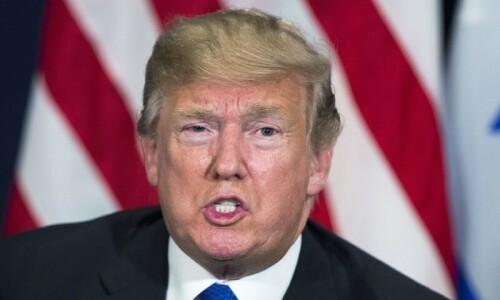WITH 245 terror attacks on security forces, police check-posts and public places — mostly in KP and Balochistan — in the first quarter of 2024 alone, it is obvious that terrorism is once again eating into the vitals of Pakistani state and society. However, what is more horrendous is the repetition of the pattern of violence that Pakistan, especially KP, witnessed a few decades ago; terror is once again stalking various parts of the country, especially Malakand Division and the former Fata region.
On May 9, a girls’ school was set ablaze in the scenic Shawa valley of South Waziristan. On May 17, the people of lower South Waziristan awoke to the terror of a bomb attack on another girls’ school. On May 29, a girls’ school was torched in Shakhimir village in Razmak, North Waziristan. Thirty-four schools, mostly girls’ schools, are on the verge of closure in central Kurram district due to lack of funds. All this has happened a year or so after Afghanistan banned secondary and higher education for girls there — as happened under the first Afghan Taliban regime. In the latter case, some two decades ago, the terror syndicate in KP followed suit.
The terror syndicate and violent extremists see gender diversity as a threat to their discourse of homogenisation. They are scared of gender diversity as much as they are of aesthetics and cultural diversity. The religious militant discourse constructs women as objects devoid of any human agency. Women must have no public role in the worldview of the proponents of this discourse, who wish to destroy every space that women can use for a public role. Their destructive tendencies start with torching and bombing girls’ schools. Destroying girls’ schools with impunity at this time marks the beginning of another phase of the rule of violence.
Victims of the empire of violence include music, art and poetry.
On May 30, a student of Malakand University, Musa Khan, died in a heart-wrenching motorbike accident. It was later revealed that the circumstances that led to the accident may have been created inside the university. Musa Khan had been issued a show-cause notice and then an expulsion letter by the university, because he had allegedly brought a rubab to a university event. This had put the young student under severe mental pressure, which might have resulted in his accident. On May 31, renowned folk artist Said Wali Wazir of Janikhel, Bannu was manhandled and his musical instruments broken by the local police. This seems to have been on account of the dread spread by the terror syndicate that is opposed to music. Said Wali Wazir’s music concerts are already banned in his area.
Like women, primary victims of the empire of violence include music, art and poetry. The terror syndicate demonstrated its abhorrence for music, art and poetry two decades ago; the pattern is now being repeated: as they are an expression of aesthetics and the beauty of life, music, art and poetry must be banished from the social structure and cultural norms. Instead, the narrative of ugliness must be injected into life. This entire discourse hinges on erasing our natural feelings for beauty and artistic expression. Music, art and poetry are powerful tools to encourage sociocultural gatherings; the terror syndicate wishes to keep the people isolated. Music, art and poetry keep the people rooted in their home soil, while the terror syndicate wants them to be uprooted.
When one looks at this saga, along with the attacks by violent mob ransacking severalchurches in Jaranwala town, Faisalabad, in August 2023, and an attack on a Christian house and factory in Sargodha on May 26, 2024, one reaches the conclusion that religious diversity is also under severe threat in Pakistan. The torching of girls’ schools and targeting music, art and poetry by the terror syndicate in KP and attacks on religious minorities by extremists in Punjab clearly indicate a pattern of the rule of violence in the country.
Political parties, civil society organisations, the intelligentsia, media persons, women associations and youth groups need to wake up to the danger zone ahead. Folk music concerts, poetry recital sessions, cultural fairs, arts exhibitions, study circles and other cultural activities need to be regularly organised in educational institutions and public places, especially in KP. Policies that facilitate violent extremist private militias and the use of religion for political interests need to be challenged. A paradigm shift in foreign policy formulation needs to be advocated at all forums. Genuine federalism and a constitutional dispensation need to be underscored. Lastly, sociopolitical and sociocultural activism must be facilitated in educational institutions and the larger society.
The writer is author of The Militant Discourse.
Published in Dawn, June 20th, 2024












































Dear visitor, the comments section is undergoing an overhaul and will return soon.